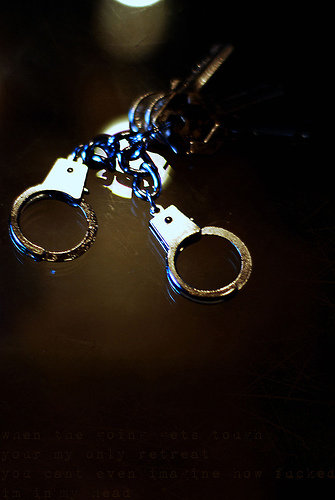The outcry over the Tennessee woman who put her adopted son on a plane to Russia earlier this month has been fast and furious.
But for all the stories admonishing Torry Hansen for not understanding there's no such thing as a return policy on adopted children are the parents who are living her story — and sympathizing with her actions.
Helen, a mother of two adopted daughters from Russia, agreed to speak with The Stir (on condition of anonymity to protect her family) about being on a first-name basis with the police in her town and daily fears that she'll return home to find her house burned to the ground.
What pushed your decision to adopt two at the same time?
They're biological sisters. We heard the story of these girls, and something triggered in us that they were perfect for us. Really, we believed that for a long time. To this day, we still wonder if this was the right thing to do?
We try to believe we did the right thing. Would you do it over again? That's not the kind of way I look at life, so I avoid that concept. We wrestle with the concepts of the way life is in Russia — would they have been better off there?
Even the adoption agency coordinators back in Russia told us flat out that the kids get out of the orphanage at 16 there. They would've grown up to be drug addicts, prostitutes, or in a coffin.
Our kids are a little bit older now, but they really didn't have a future. Even to this day, they don't understand that. We don't want to push that concept too much, because then they'd look back and wonder what happened to all their best buddies in Russia.
All the controversies of the woman from Tennessee and saying this boy is a psychopath — I don't doubt it at all. You look at the picture of him and you can kind of tell. The Russians are saying he's normal; maybe it just depends what their definition of "normal" is.
They really do have a different definition of normal. I don't hold my agency accountable for what happened or for the state of my kids. It could've gone any way. I do know some kids who have been adopted who turn out fine.
I don't hold them accountable for saying you should've known. Maybe in retrospect I should've been a little more realistic.
Can you give us some background on your adoption story?
We suffered the infertility issue for about 10 years and did in vitro several times, but it didn't work. We heard about our girls — they were older when we heard about them; they were 10 and 12, and they were with a bunch of other kids who were up for adoption at the same time.
They were all coming to America for a summer visit, and we met them in that process, kind of heard their story. It tugged our heart strings and we fell in love with their pictures. We said yeah, we want to adopt them. We weren't even thinking about adoption at that point.
Russia requires two visits with the children, but since they came here for the first time, we didn't have to go to Russia twice. They came here; we spent a few weeks with them and then finished up the rest of our paperwork. Contrary to popular opinion, there's a lot of really tough paperwork and lots of investigations to go through with Russian adoptions.
It's really intense. We did ours at a fast pace, and it still took us nine months.
How long ago was this?
2004. And it included FBI checks, home visits by social workers, deep background checks, and recommendations by many people. There was all the stuff that got kicked back from Russia: "Change this form, we want it this way." There are health checks and psychological checks.
Was there any sort of counseling for you?
No. In the end, there were a lot of us who adopted around the same time and we all became a support group ourselves. After about a year, we got in touch with a support group … in New York City. We have activities and dinners and things like that, and we e-mail things back and forth.
I'm not going to blame the agency or anything. I think for our level of issues, no support group really would've helped.
Do you mind talking a little about those issues?
Our kids — we definitely didn't realize this right away — they have reactive attachment disorder. I didn't even know the symptoms, but I thought, Oh, those kids don't bond. So when they first came over, they clung to everyone. We thought, Oh, of course they're going to bond, they're going to love us, they love everybody.
They were hugging and kissing and professing their love to everyone. It turns out that's actually one of the symptoms of reactive attachment disorder, throwing themselves in love with complete strangers. They had never really formed the true bond, a true trust, and a true love. They can't do it.

Flickr photo by notsogoodphotographyAt one point, our kids sat us down and said their friends were the only thing that mattered to them because they were in the orphanage so long that those were the only people they could count on.
We got it, and there was nothing we could do about it. We tried to be there for them, but their friends are the only thing that matter.
Our kids were in an orphanage with 300 others with really minimal supervision. It was a very gang-like atmosphere. They came here and couldn't — still can't — understand restrictions and guidelines and curfews.
In the beginning, I was very strict. It's the way I was brought up. Now my guidelines are basically you need to go to school and you need to be home on time. I've become more strict as far as safety and trying to make sure they do certain things to keep themselves safe, but being good citizens and trying to be well educated … that's really all out the window.
On your worst days, did you ever think, Put 'em on a plane and get 'em out of here?
I'll tell you that concept, I never even … well, one Christmas Day a few years ago, my mother spent the entire day trying to get me to dissolve the adoption. I don't have that in me to say, "OK, I'm going to give you up."
I couldn't do that. I figure this is something I committed to. I don't think I could give my kids up. But I can very honestly, flat out understand why that woman did it.
I live in horror every day. I live in fear. I really do. We have a lock on our bedroom door. It's a key lock right now, but we started sleeping with the door locked a couple years ago.
We have a locking mailbox because mail was disappearing — obviously nothing from school ever got to us — and we were worried about bills and identity theft.
We hide things in a safe, any valuables go into a safe or into the bedroom. We used to make jokes about "let's take a family trip to Nebraska" because a couple years ago, they had the safe-haven law where you could abandon your child regardless of age.
It's nothing you could ever do, but you get very desperate. You live in fear all the time of what's going to happen.
Every night I'd be driving down the road and take the turn into my neighborhood and I'd wonder if the house had burned down? What's been stolen? Every day is wondering what's going to go wrong next.
We take the AA concept — we just deal with one day at a time. If you think too much about what can happen — we can't take a vacation, we can't go anywhere, holidays are a nightmare, birthdays are a nightmare because the attention has to be on them all the time. If it's one girl's birthday, the attention is too much on that one and the other one freaks out.
If you think about it too far back, too big picture, it's terrifying. You just take one day at a time hoping you don't get a call from school that one's been suspended. We learned that you have to call the police and file complaints when they blow off the curfew. The local police have become good friends and they know us by name, and they come up to the house. When they fill out the reports, they already know all my details, my birthday, my middle name, and everything.
Do you think it'd be different if they were younger or if they were adopted from elsewhere?
I think if they were younger, our odds of them having problems would've been reduced. They spent a long time in the orphanage, which wasn't a healthy atmosphere. The years that they were with their actual family were very abusive and horrible. There was no quality of life there, and they still miss their family. They still look up to their family as the greatest ever, even though they were abused.
That makes a huge difference, and if we'd gotten them from a domestic adoption, we know there could've been problems, but the odds are better again because there's not as much poverty, there's not as much rampant abuse and alcoholism. Most kids are born in Russia with the threat of fetal alcohol syndrome.
A lot of those factors that go into ending up with troubled kids aren't as bad here.
Do you look forward to them turning 18?
As it turns out, 18 isn't really the mark. Eighteen is the point when you don't have to file the police report, but here you're responsible for your child until 21. You're financially responsible. It's actually more difficult; you can't tell an 18-year-old what to do, but you're going to be responsible for them.
Now we're thinking 21. We used to think 18 was the mark, but 18 is a little scary too.
If someone starts talking adoption around you, do you tense up and say no, no, no?
I give an informed opinion as asked. Most people around me know my story because talking and joking about it is my therapy. I'll give informed comments. I'm pretty against older adoptions.
It breaks my heart because some of the kids we know who were adopted at an older age are growing up fine. There's just so much potential for problems. To adopt from Russia or not, it's tough. I don't want to sway, but if I'm asked, I'll say it may not work out.
With the news that adoptions are suspended from Russia, I know the heartache that those families are going through. When we were going through our adoption process, Russia started creating a lot of restrictions. They suspended things, and they changed approvals.
I remember thinking we set all our hopes and dreams on this — and money — what if they can really say no? That was horrifying.
But then again I sit here and wonder what if we'd been spared all this heartache and this horror if it had been stopped? Would that have been a good thing? All these people that are suffering because of these suspended adoptions, is that going to save a few families?




